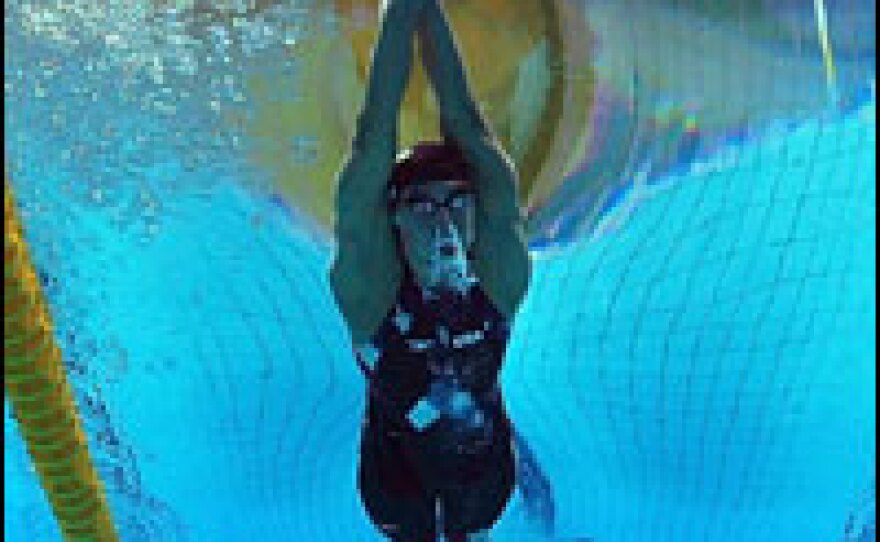
It's a good thing Michael Phelps has such broad shoulders. He'll need them. Not just in the pool, but everywhere he goes this week as the expectations build day by day.
He'll need all the inner resources he can muster, because what's happening in Beijing could get really crazy.
Right after Phelps won his first gold medal Sunday in the 400-meter individual medley, he was approached by the usual throng of reporters. Around the corner some more reporters spotted Phelps, and they piled in, knocking over a rope line barrier and nearly flattening the swimming star. Phelps wisely stepped aside. Since then, the post-race barrier that separates the swimmers from the press has been replaced with something more substantial.
And Phelps will surely start to wall himself off from all the shouted questions, especially the one that's become so familiar: "Michael, can you win eight gold medals?" One can hardly blame him for sounding fatigued, as he does when answering for the billionth time. But as the gold medals mount — he's won three already and all in world record time — it's the question that lies at the heart of these Olympics.
In so many ways, the expectations are ridiculously unfair. NBC called him "Tiger Woods in a Speedo" after his first medal race. For Phelps to achieve history, all the moving parts need to work together perfectly. Three of his races are relays in which the outcomes are essentially out of his control. (His teammate, Jason Lezak, kept Phelps in the eight-gold hunt with his epic anchor leg in the 4x100 relay.)
So many things can derail him: a relay disqualification, an opponent who swims the race of his life, or exhaustion from swimming so hard, so often.
Swimmers choose an unforgiving, rigorous existence when they reach the elite level. They swim before dawn or during odd hours when their friends are off having fun. They swim thousands of meters a day — back and forth, looking at the black lines at the bottom of the pool. Olympic swimmers face a different, more concentrated pressure than other top athletes. They train for years, and their athletic legacy comes down to what they can accomplish in just a couple of minutes.
If Tiger Woods loses one of the golf majors, he has three more chances to win each year. If Kobe Bryant clangs a bunch of jump shots, he'll make up for it a few days later in the next game. Roger Federer loses Wimbledon? Well, there's always the U.S. Open.
For Olympic swimmers, though, it's like studying your entire life for a single examination.
Michael Phelps has chosen this pressure cooker. He's marketed himself with the PowerBar and Visa commercials and a rich Speedo contract. So he's got a hand in the hype that surrounds him.
Still, it's hard not to sympathize with Phelps as his voice goes flat with an edge of weariness over the sheer repetition of the query. He knows the question. We all know the question. Let's sit back and find out the answer.
Copyright 2022 NPR. To see more, visit https://www.npr.org. 9(MDAzMjM2NDYzMDEyMzc1Njk5NjAxNzY3OQ001))






